The Bill Show
Hi, my name is Bill. Welcome to my show. This is our first episode. Thank you for attending. Let's begin.
Our Top Story: Fablescon, Ten Years Ago
Ten years ago today was the final day of my convention, called Fabletown and Beyond. It took place in Rochester, Minnesota, which is still the dead of winter in these parts. Many were interested, but decided not to attend for that reason, but those who did show up seemed to have a nice time, and thought the adventure was well worth it.
Fablescon (short for Fabletown and Beyond) existed more or less for one reason: I wanted to see if I could do it. I’d been in the funny book business for just over thirty years by then (more than forty now), and had attended many comic book and science fiction conventions (not to mention a smattering of tabletop gaming conventions, folklore conventions, book fairs, exactly one Star Trek convention, and even a UFO convention). Having been to all of those, like most do I suppose, I gradually formed a mental list of everything I liked about the better shows, meaning what did they do right, and everything I disliked about the less than stellar shows, meaning what (in my perhaps jaded opinion of course) they did wrong.
While I won’t inflict the entire list on you, here are a few of the highlights and lowlights.
Programming: For most conventions this means the panels, and most panels at most shows were run pretty slipshod. Guests showed up late, and unprepared with anything interesting and insightful to say about the subject at hand. Panel moderators often didn’t know the other panelists and didn’t care to find out. And yet, for many convention attendees, this was the show. This is what they paid out their hard-earned dollars for. I thought, if I ever did a convention, the programming would be carefully constructed. Guests would show up to their panels on time, and they’d know their stuff. At Fablescon I gave us a B- in this endeavor. We almost got it right, and most of the attendees gave the programming good marks.
Ceremony: In science fiction fandom, their conventions tended to focus more on getting together to talk (and sometimes argue) about the books they love with like-minded individuals. As a result it took some time for fantasy and science fiction shows to catch on to the idea that there should be a robust dealers room, full of vendors selling hard to find books, and various other things their fan base might want to buy. But, they did a few things right that I was surprised comic shows didn’t do. For one thing, they began. Where comic shows simply had a start time, at which time the doors opened, and that was as much ceremony surrounding the beginning the affair as one could expect, books shows usually had an opening ceremony at the beginning of the show, where the attendees were welcomed, the guests were each introduced, and a few matters of business and information were disseminated to one and all. Then, at the end of the show they had a closing ceremony, where the show runners and guests thanked the audience for spending the weekend with them, a few prizes and accolades were handed out, and we parted well. I liked these bits of business at the book shows I had attended through the years, and resolved to adopt the practice for Fablescon. It worked out quite well (except that I forgot to give out the one big announcement at the closing ceremony — namely which artist won the contest to draw a Fables story. Luckily, the audience reminded me, with vigor and enthusiasm before I could get out of the room).
A Good Bar: One thing in which comic shows and book shows share philosophies is that every good show needs to have a good and reliable bar. It needs to be open late, be well stocked, and not manned by hotel employees who are clearly resentful of their customers. You’d be surprised how many hotels hosting a convention get this wrong. So, when we negotiated the contract with our hosting hotel, arranging for a well-run bar was a top priority. In fact, since the hotel didn’t have the right sort of facility suitable to our expressed needs, but did have the shell of an old Tudor-themed restaurant on hand, we cleaned it up and opened it up for the convention. Basically we opened our own bar, and it was glorious. I give us an A+ on our bar. We also arranged the schedules of our guest list so that at least one guest, in rotation, would be on hand at the bar at all times, to chat with the attendees, have a convivial drink or two, and generally make everyone feel as welcome as we could. Every convention in our industry should copy us on the Fablescon bar. My pal Brad Thomte was put in charge of bar operations. I hired him because I knew I could set out a list of goals and conditions and then forget about that part of the show from then on. He’d get it done, which he did. Thanks again, Brad.
A Good Staff: Most conventions do this pretty well. Some have a staff that constantly looks overworked and harried, and specialize in telling attendees what they aren’t able to do for them. We adopted the good and welcoming staff template. Stacy Sinner (just like a bad person in the Bible) handled that, and once again, having turned the responsibility over to her, I could forget all about it and know it was being handled well. Stacy also had a lifetime of connections in the town to get us good prices on facilities, and make good deals in all of the thousand and one items that need to be negotiated in order to put a show on its feet. Thank you, Stacy.
Fun Stuff: We wanted to make sure there were fun things to do beyond the usual stuff at a comic book show. The midnight pool party was one such event. And look at Brad modeling our Fablescon T-Shirt, designed by our Guest of Honor, Mark Buckingham.
There’s more. Lots more. But I think that covers the bigger considerations. Feedback from our invited guests and the 505 attendees (we’d planned for 500, so I guess we really should’ve kicked five of them out) universally offered that this was one of the, if not the best conventions they’d ever attended. I’m both humbled and grateful.
Those of you who were there, what do you think now that ten years has gone by? Let us know.
This Week’s Joke
Those who know me, or who follow me on the Twitters (@BillWillingham) know I like bad jokes, the more eye-rolling the better. Every issue (or are we using ‘episode’ to describe this puppy?) I think I’ll share one of them, because this is my show and I can do what I want. Here we go with one of my favorites:
A skeleton walks into a bar and says, “Bartender, please give me a beer and a mop.”
This Week’s Writing and/or Drawing Lesson
I’m not much of a teacher. I’ve tried it once or twice, with mixed results. It’s not just a matter of knowing your field of expertise; I’ve been in the funny book/storytelling business for 40 plus years, so I’d better know something about it by now. It also requires an ability to communicate that knowledge in a structured and understandable way, so that your students can learn it. That’s where I tend to fall short.
That said, I do feel a certain responsibility to pass along some of the things I’ve found out about this storytelling business, to those of you eager to learn how to do it, or who already do it and want to get better at it. So, from time to time The Bill Show will include a segment on some aspect of learning the business.
In this case, let’s talk a little bit about the joke I just told in the item directly above this one. It’s not only a fine joke (perhaps even a great one) it nicely illustrates one aspect of writing comics that not every accomplished writer in other fields immediately groks. Good comic book writing is terse. It has to be. We have very few pages per issue, and very few panels in those pages, in order to tell our tale. Blather on too long, for too many words, and the page gets crowded, and the art on that page gets squeezed out. You’ve all seen what happens when the writing steps all over the art. The art in a comic tells the majority of the story, so the writing needs to be there to clarify and sometimes artfully decorate what the illustrations show us, and then get the hell out of the way. When Twitter first began, with its strict limitation on the number of characters (words) allowed per Tweet, comic book writers looked at their limits and said, “Look at all that luxurious room I have!” True story.
Okay then, but what does that have to do with the joke above? Simply put, look at how much information is communicated in so few words. It’s positively overflowing with information you can glean from the single line. We know, in this fictional world, it’s possible for skeletons to walk and talk as if they were a living being, so some sort of magic system is in effect. We know that the world at large knows this, and seems to be okay with this, because the hero of our tale, the skeleton, walks into a bar and no one runs screaming out into the night. It must be a common enough thing so as to imply it’s within the bounds of the ordinary. But what do we know about our protagonist? What sort of fellow is he? Well, right off the bat we know he’s not a thug. He’s got a sense of responsibility and accountability. He doesn’t ask the bartender for a beer and then tell him he should get ready to mop. He asks for the mop too. He’s the sort of fellow who will clean up his own messes. We learn all of that from just seventeen words. My friends, that is an example of terse, bare-bones (if you’ll pardon my pun) storytelling. If you want to write comic books, be thou like the skeleton joke.
We Pause for This Commercial Message
Today’s episode of The Bill Show is brought to you by the comic series Fables. About twenty years ago we started the ongoing monthly comic series, and kept it going for 150 issues, which maps out to about thirteen years. It did well, swimmingly in fact, for which thank you so much, those of you who bought it and read it and told your friends to do likewise. Now, to mark the 20th Anniversary of the book, we’ve begun a new 12-issue Fables story called The Black Forest. It’s available now, through Amazon, or other online book dealers, or at your local comics shop. I believe six or seven of the twelve issues have come out, and there’s still more than enough time to snatch those copies up. I’d appreciate it, and I have every confidence (or at least a strong hope) you will too.
The Black Forest picks right up where the main storyline of Fables # 150 left off. The Fabletown castle was destroyed in a massive and deadly magical duel, which destroyed the many spells concealing Fabletown from the mundy world. Suddenly the mundys know living Fables are amongst them, and they move in, in force. What happens next? Read and see, my friends.
Our Closing Benediction
Thank you for taking a moment out of your day to join us here at The Bill Show studios for our first ever Bill Show. If you liked this, please tell your friends. If you didn’t like it, please tell your enemies. After all, why should you have had to suffer through such an ordeal, and they escape unscathed? How’s that justice?




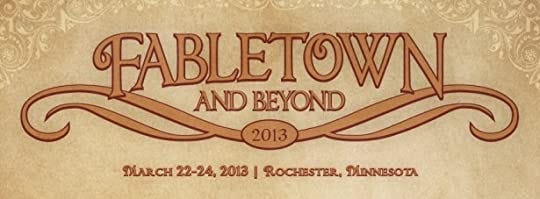

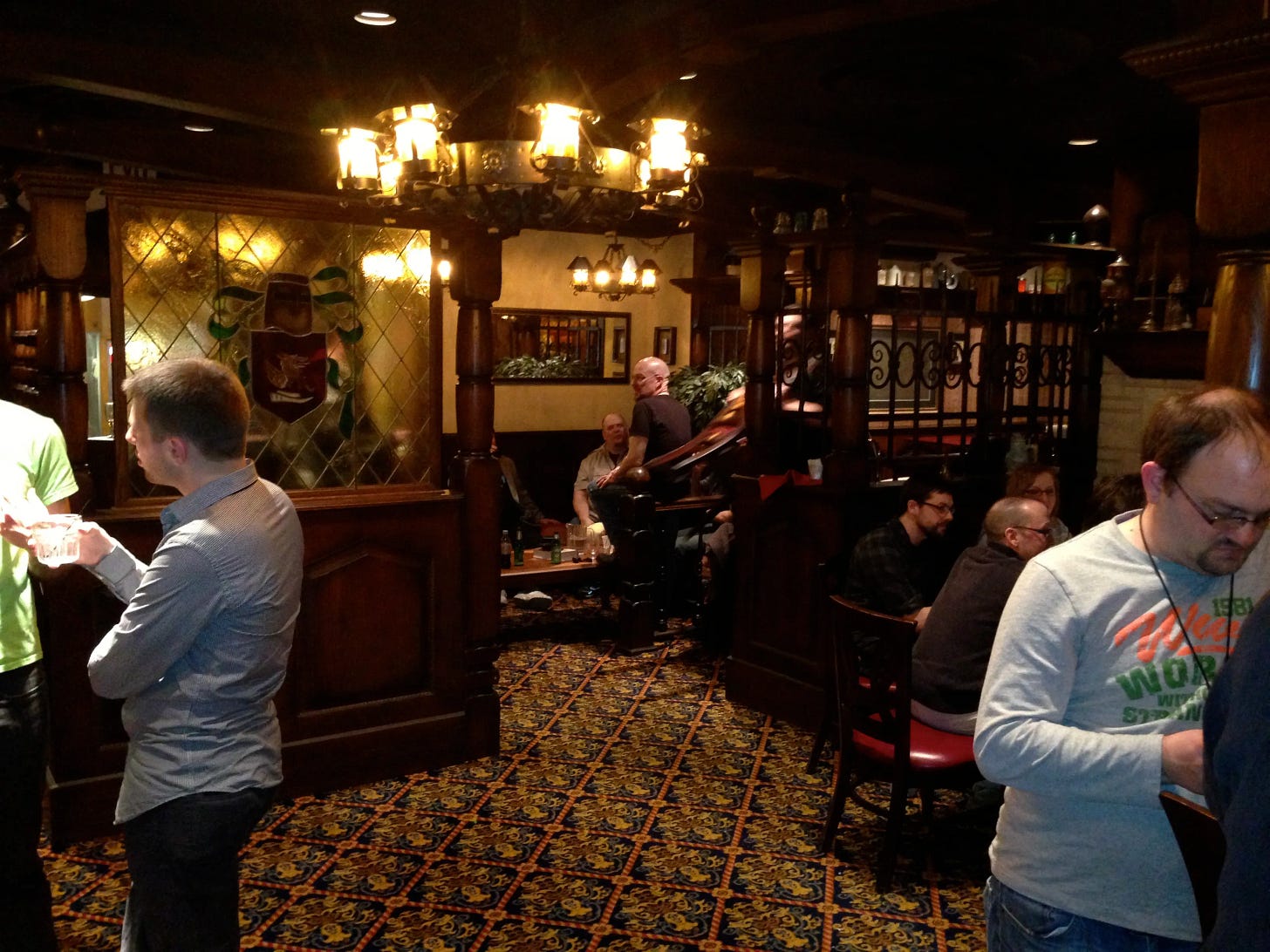
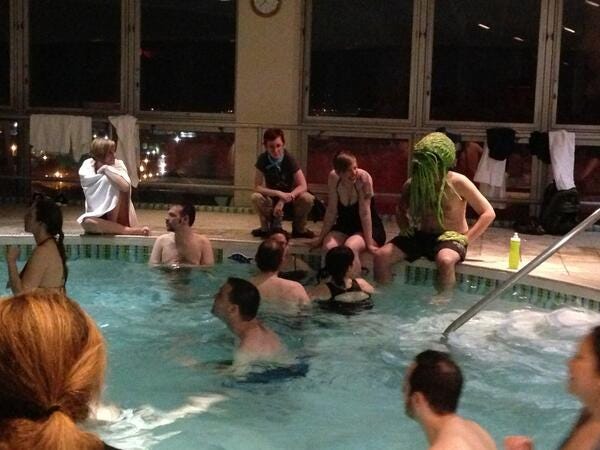
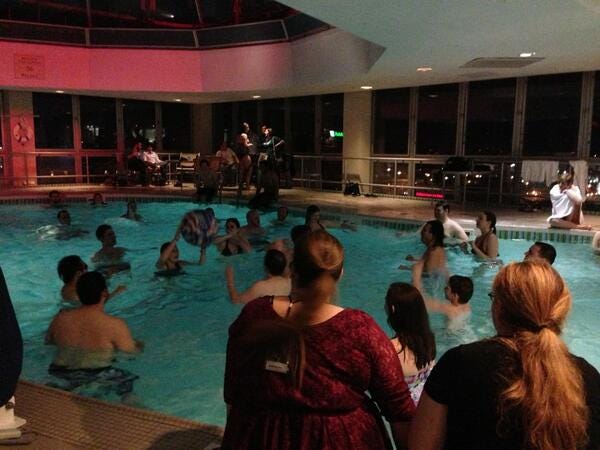
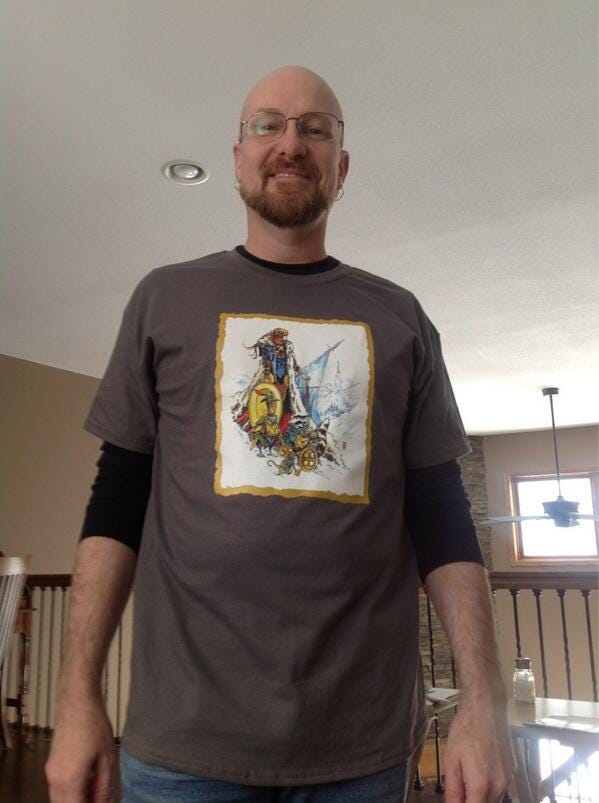


I'm glad to see you posting again. I was beginning to wonder if something had gone very, very wrong. Good to see I was wrong.
Good to hear that your convention went as well as it did. I've seen and read about some that turned into utter disasters.